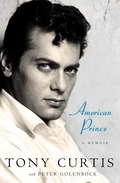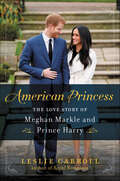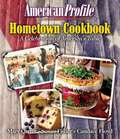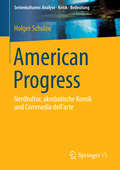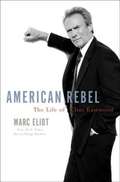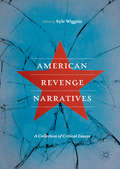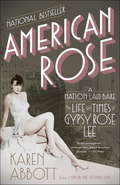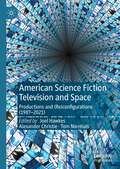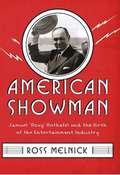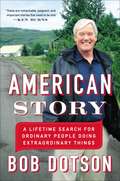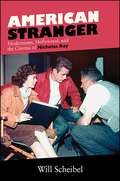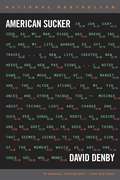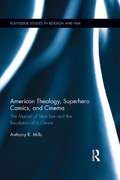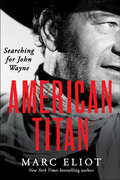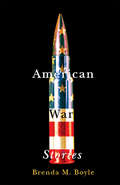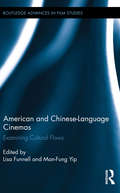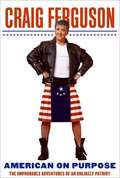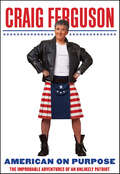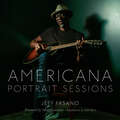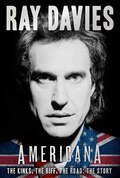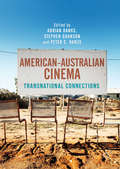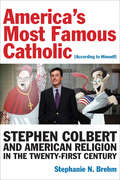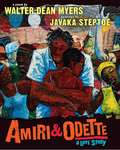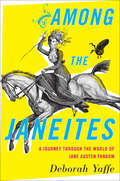- Table View
- List View
American Prince: A Memoir
by Tony Curtis"All my life I had one dream and that was to be in the movies. " He was the Golden Boy of the Golden Age. A prince of the silver screen. Dashing and debonair, Tony Curtis arrived on the scene in a blaze of bright lights and celluloid. His good looks, smooth charm, and natural talent earned him fame, women, and adulation--Elvis copied his look and the Beatles put him on their Sgt. Pepper album cover. But the Hollywood life of his dreams brought both invincible highs and debilitating lows. Now, in his captivating, no-holds-barred autobiography, Tony Curtis shares the agony and ecstasy of a private life in the public eye. No simple tell-all,American Princechronicles Hollywood during its heyday. Curtis revisits his immense body of work--including the unforgettable classics Houdini, Spartacus, and Some Like It Hot--and regales readers with stories of his associations with Frank Sinatra, Laurence Olivier, director Billy Wilder, and film industry heavyweight Lew Wasserman, as well as paramours Natalie Wood and Marilyn Monroe, among others. As forthright as he is enthralling, Tony Curtis offers intimate glimpses into his succession of failed marriages (and the one that has endured), his destructive drug addiction, and his passion as a painter. Written with humor and grace,American Princeis a testament to the power of living the life of one's dreams.
American Princess: The Love Story of Meghan Markle and Prince Harry
by Leslie CarrollA behind-the-scenes look into the life of Meghan Markle and her romance with Prince Harry—a dishy, delightful must-read filled with exclusive insights for anyone obsessed with the Royal Family.Leslie Carroll’s books on royalty are “an irresistible combination of People Magazine and the History Channel.”—Chicago TribuneWhen Prince Harry of Wales took his American girlfriend, Meghan Markle, to have tea with his grandmother the queen, avid royal watchers had a hunch that a royal wedding was not far off. That prediction came true on November 27, 2017, when the gorgeous, glamorous twosome announced their engagement to the world. As they prepare to tie the knot in a stunning ceremony on May 19, 2018, that will be unprecedented in royal history, people are clamoring to know more about the beautiful American who captured Prince Harry’s heart. Born and raised in Los Angeles to a white father of German, English, and Irish descent and an African American mother whose ancestors had been enslaved on a Georgia plantation, Meghan has proudly embraced her biracial heritage. In addition to being a star of the popular television series Suits, she is devoted to her humanitarian work—a passion she shares with Harry. Though Meghan was married once before, Prince Harry is a modern royal, and the Windsors have welcomed her into the tight-knit clan they call “The Firm.” Even a generation ago, it would have been unthinkable, as well as impermissible, for any member of Great Britain’s royal family to consider marrying someone like Meghan. Professional actresses were considered scandalous and barely respectable. And the last time an American divorcee married into the Royal Family, it provoked a constitutional crisis!In American Princess, Leslie Carroll provides context to Harry and Meghan’s romance by leading readers through centuries of Britain’s rule-breaking royal marriages, as well as the love matches that were never permitted to make it to the altar; followed by a never-before-seen glimpse into the little-known life of the woman bringing the Royal Family into the 21st century; and her dazzling, thoroughly modern romance with Prince Harry.
American Profile Hometown Cookbook: A Celebration of America's Table
by Mary Carter Susan Fisher Candace Floyd"In this extraordinary cookbook, you'll find traditional American favorites with a unique twist alongside ethnic creations from around the world. Also included are helpful tips from American Profile's test kitchen as well as 30 articles on hometown festivals and fairs across the nation that give you a sneak peek into the lives of the ordinary citizens that make up hometown America. Whether it's a simple soup for the family or a full meal for visitors, the American Profile Hometown Cookbook has just the right recipe to make any gathering a special occasion."
American Progress: Nerdkultur, akrobatische Komik und Commedia dell'arte (Serienkulturen: Analyse – Kritik – Bedeutung)
by Holger SchulzeDie Serie 30Rock wälzt die medialen Erzählungen ihrer Epoche (und der Serie selbst) unaufhörlich um: in bislang sieben Staffeln, 140 Episoden, von 30 Autoren für 14 SchauspielerInnen geschrieben - rund um die Erfinderin und Hauptdarstellerin Tina Fey. Dieser Band untersucht die überdrehte Gegenwartsdystopie, ihre Erzählungen, Bühnen und Personen. Markante Episoden werden im Zusammenhang zeitgenössischer Pop- und TV-Kultur untersucht und einzelne ProtagonistInnen in ihrem medialen Handeln und dessen Referenzen. Ein Tableau der Medien- und der Nerdkultur sowie der politischen Agitation entsteht in Form von akrobatischer Komik und Celebrityobsession: eine Form der Commedia dell'arte über den American Progress.
American Rebel: The Life of Clint Eastwood
by Marc EliotAs an actor, he seduces us with his tough-guy charm. As a director and producer, he amazes us with his artistry and technical savvy. As a Hollywood icon, Clint Eastwood, one of film's greatest living legends, represents some of the finest cinematic achievements in the history of American cinema. In American Rebel, bestselling author and acclaimed film historian Marc Eliot examines the ever-exciting, often-tumultuous arc of Clint Eastwood's life and career. Unlike past biographers, Eliot writes with unflinching candor about Eastwood's highs and lows, his artistic successes and failures, and the fascinating, complex relationship between his life and his craft. Eliot's prodigious research reveals how a college dropout and unambitious playboy rose to fame as Hollywood' s "sexy rebel," eventually and against all odds becoming a star in the Academy pantheon as a multiple Oscar winner. Spanning decades, American Rebel covers the best of Eastwood' s oeuvre, films that have fast become American classics–Fistful of Dollars, Dirty Harry, Unforgiven, Mystic River, Million Dollar Baby, and Gran Torino. Filled with remarkable insights into Eastwood's personal life and public work, American Rebel is highly entertaining and the most complete biography of one of Hollywood's truly respected and beloved stars–an actor who, despite being the Man with No Name, has left his indelible mark on the world of motion pictures.From the Hardcover edition.
American Revenge Narratives: A Collection of Critical Essays
by Kyle WigginsAmerican Revenge Narratives critically examines the nation’s vengeful storytelling tradition. With essays on late twentieth and twenty-first century fiction, film, and television, it maps the coordinates of the revenge genre’s contemporary reinvention across American culture. By surveying American revenge narratives, this book measures how contemporary payback plots appraise the nation’s political, social, and economic inequities. The volume’s essays collectively make the case that retribution is a defining theme of post-war American culture and an artistic vehicle for critique. In another sense, this book presents a scholarly coming to terms with the nation’s love for vengeance. By investigating recent iterations of an ancient genre, contributors explore how the revenge narrative evolves and thrives within American literary and filmic imagination. Taken together, the book’s diverse chapters attempt to understand American culture’s seemingly inexhaustible production of vengeful tales.
American Rose: A Nation Laid Bare: The Life and Times of Gypsy Rose Lee
by Karen AbbottWith the critically acclaimed Sin in the Second City, bestselling author Karen Abbott "pioneered sizzle history" (USA Today). Now she returns with the gripping and expansive story of America's coming-of-age--told through the extraordinary life of Gypsy Rose Lee and the world she survived and conquered. America in the Roaring Twenties. Vaudeville was king. Talking pictures were only a distant flicker. Speakeasies beckoned beyond dimly lit doorways; money flowed fast and free. But then, almost overnight, the Great Depression leveled everything. When the dust settled, Americans were primed for a star who could distract them from grim reality and excite them in new, unexpected ways. Enter Gypsy Rose Lee, a strutting, bawdy, erudite stripper who possessed a preternatural gift for delivering exactly what America needed. With her superb narrative skills and eye for compelling detail, Karen Abbott brings to vivid life an era of ambition, glamour, struggle, and survival. Using exclusive interviews and never-before-published material, she vividly delves into Gypsy's world, including her intensely dramatic triangle relationship with her sister, actress June Havoc, and their formidable mother, Rose, a petite but ferocious woman who seduced men and women alike and literally killed to get her daughters on the stage. American Rose chronicles their story, as well as the story of the four scrappy and savvy showbiz brothers from New York City who would pave the way for Gypsy Rose Lee's brand of burlesque. Modeling their shows after the glitzy, daring reviews staged in the theaters of Paris, the Minsky brothers relied on grit, determination, and a few tricks that fell just outside the law--and they would shape, and ultimately transform, the landscape of American entertainment. With a supporting cast of such Jazz- and Depression-era heavyweights as Lucky Luciano, Harry Houdini, FDR, and Fanny Brice, Karen Abbott weaves a rich narrative of a woman who defied all odds to become a legend--and whose sensational tale of tragedy and triumph embodies the American Dream.From the Hardcover edition.
American Science Fiction Television and Space: Productions and (Re)configurations (1987-2021)
by Joel Hawkes Alex Christie Tom NienhuisThis collection reads the science fiction genre and television medium as examples of heterotopia (and television as science fiction technology), in which forms, processes, and productions of space and time collide – a multiplicity of spaces produced and (re)configured. The book looks to be a heterotopic production, with different chapters and “spaces” (of genre, production, mediums, technologies, homes, bodies, etc), reflecting, refracting, and colliding to offer insight into spatial relationships and the implications of these spaces for a society that increasingly inhabits the world through the space of the screen. A focus on American science fiction offers further spatial focus for this study – a question of geographical and cultural borders and influence not only in terms of American science fiction but American television and streaming services. The (contested) hegemonic nature of American science fiction television will be discussed alongside a nation that has significantly been understood, even produced, through the television screen. Essays will examine the various (re)configurations, or productions, of space as they collapse into the science fiction heterotopia of television since 1987, the year Star Trek: Next Generation began airing.
American Showman: Samuel "Roxy" Rothafel and the Birth of the Entertainment Industry, 1908–1935 (Film and Culture Series)
by Ross MelnickSamuel "Roxy" Rothafel (1882–1936) built an influential and prolific career as film exhibitor, stage producer, radio broadcaster, musical arranger, theater manager, war propagandist, and international celebrity. He helped engineer the integration of film, music, and live performance in silent film exhibition; scored early Fox Movietone films such as Sunrise (1927); pioneered the convergence of film, broadcasting, and music publishing and recording in the 1920s; and helped movies and moviegoing become the dominant form of mass entertainment between the world wars. <P><P>The first book devoted to Rothafel's multifaceted career, American Showman examines his role as the key purveyor of a new film exhibition aesthetic that appropriated legitimate theater, opera, ballet, and classical music to attract multi-class audiences. Roxy scored motion pictures, produced enormous stage shows, managed many of New York's most important movie houses, directed and/or edited propaganda films for the American war effort, produced short and feature-length films, exhibited foreign, documentary, independent, and avant-garde motion pictures, and expanded the conception of mainstream, commercial cinema. He was also one of the chief creators of the radio variety program, pioneering radio broadcasting, promotions, and tours.The producers and promoters of distinct themes and styles, showmen like Roxy profoundly remade the moviegoing experience, turning the deluxe motion picture theater into a venue for exhibiting and producing live and recorded entertainment. Roxy's interest in media convergence also reflects a larger moment in which the entertainment industry began to create brands and franchises, exploit them through content release "events," and give rise to feature films, soundtracks, broadcasts, live performances, and related consumer products. Regularly cited as one of the twelve most important figures in the film and radio industries, Roxy was instrumental to the development of film exhibition and commercial broadcasting, musical accompaniment, and a new, convergent entertainment industry.
American Story
by Bob DotsonThe host of the NBC Today Show's popular segment shares his favorite stories of citizens making a difference around the country For the six million people who watch the Emmy Award-winning "American Story with Bob Dotson" on NBC's Today Show, Bob Dotson's reports celebrate the inspirational stories of everyday Americans. Dotson has been crisscrossing the country for more than forty years--logging more than four million miles--in search of people who have quietly but profoundly changed our lives and our country for the better. Now, in American Story, he presents a road map to the unsung heroes with thoughtful solutions to problems we all face, incredible ideas that work, and blueprints to living our dreams. *The boss who came out of retirement to start a new company for his former employees who could not find work *The truck driver who taught microsurgery *The man you've never heard of who has 465 profitable patents, second only to Thomas Edison *The doctor who developed the vaccine to prevent whooping cough, who didn't retire until age 104 In the tradition of Tom Brokaw's New York Times bestseller The Time of Our Lives, American Story is a deeply moving and endlessly fascinating alternative narrative for everyone who yearns to feel good about America. .
American Stranger: Modernisms, Hollywood, and the Cinema of Nicholas Ray (SUNY series, Horizons of Cinema)
by Will ScheibelHow does cinema culture imagine one of its favorite figures, the rebel? The reputation of the American director Nicholas Ray provides a particularly notable example. Most famous for Rebel Without a Cause, Ray has since been canonized as a "rebel auteur" and celebrated for seeking a personal vision and signature style under the industrial pressures of Classical Hollywood during its late studio period. In American Stranger, Will Scheibel reconstructs how Ray's reputation developed over time, analyzing the different historical practices of modernism that set new horizons for artistic rebellion in postwar cinema.Drawing on biographical legends, interviews, film reviews, articles in both national newspapers and international film magazines, and star promotion and publicity, Scheibel examines the contexts in which Ray's reputation was constructed. These include the consolidation of director-based film criticism and the rise of film studies as an academic discipline; star performances and personifications of the rebel male in Ray's films; the counterculture in which Ray promoted himself as a teacher and worked as a political avant-gardist; and the art cinemas of Jean-Luc Godard, Wim Wenders, and Jim Jarmusch, each of whom were influenced by Ray. In addition to Rebel Without a Cause, Scheibel also analyzes such classic films as The Lusty Men and In a Lonely Place, as well as collaborative, less-examined films from his later career outside of Hollywood, We Can't Go Home Again and Lightning Over Water. Reconstructing the evolution of Ray's place in cinema culture, this intellectual history measures the standards for both rebellion and convention, for the vanguard and the establishment, that determine an artistic reputation.
American Sucker
by David DenbyIn early 2000, the bottom dropped out of the life of New Yorker writer David Denby when his wife announced she was leaving him. To make matters worse, it looked as if he might lose the beloved New York apartment they shared with their children. Determined to hold on to his home and seized by the "irrational exuberance" of the stock market, then approaching its peak, Denby joined the investment frenzy with a particular goal: to make one million dollars so he could buy out his wife's share of their place. Denby gathered courage from stock analysts and from the siren song of CNBC. He listened both skeptically and raptly to dreaming tech gurus and boastful CEOs at investment conferences. He got to know such charming and persuasive New Economy stars as ImClone founder (and Martha Stewart buddy) Sam Waksal and Merrill Lynch Internet analyst Henry Blodget, both of whom would eventually be disgraced in scandals that affected millions of investors. Racing around the country, he struggled to understand the leading-edge technologies of fiber optics and anticancer biotech therapies. He plunged into a season of mania and was swept forward on the alternating currents of hope, greed, hucksterism, and American optimism that caught up so many in that era -- with cataclysmic results. American Sucker is a beautifully written, mesmerizing account of those years of madness. What begins as a money chase becomes an encounter with such eternal issues as envy, time, love, and death, leading to a slow recovery of sanity and happiness. This is a classic tale of the bubble related not by a market guru or an investment professional but by a witty, perceptive, and eloquent outsider. Book jacket.
American Theology, Superhero Comics, and Cinema: The Marvel of Stan Lee and the Revolution of a Genre (Routledge Studies in Religion and Film)
by Anthony MillsStan Lee, who was the head writer of Marvel Comics in the early 1960s, co-created such popular heroes as Spider-Man, Hulk, the X-Men, the Fantastic Four, Iron Man, Thor, and Daredevil. This book traces the ways in which American theologians and comic books of the era were not only both saying things about what it means to be human, but, starting with Lee they were largely saying the same things. Author Anthony R. Mills argues that the shift away from individualistic ideas of human personhood and toward relational conceptions occurring within both American theology and American superhero comics and films does not occur simply on the ontological level, but is also inherent to epistemology and ethics, reflecting the comprehensive nature of human life in terms of being, knowing, and acting. This book explores the idea of the "American monomyth" that pervades American hero stories and examines its philosophical and theological origins and specific manifestations in early American superhero comics. Surveying the anthropologies of six American theologians who argue against many of the monomyth’s assumptions, principally the staunch individualism taken to be the model of humanity, and who offer relationality as a more realistic and ethical alternative, this book offers a detailed argument for the intimate historical relationship between the now disparate fields of comic book/superhero film creation, on the one hand, and Christian theology, on the other, in the United States. An understanding of the early connections between theology and American conceptions of heroism helps to further make sense of their contemporary parallels, wherein superhero stories and theology are not strictly separate phenomena but have shared origins and concerns.
American Titan: Searching for John Wayne
by Marc EliotAs he did in his bestselling biographies of Cary Grant, Jimmy Stewart, and Clint Eastwood, Marc Eliot offers an exciting, groundbreaking new take on an American icon—the most legendary Western film hero of all time, John WayneAn audience favorite and top box-office draw for decades, John Wayne symbolized masculinity, power, and patriotism, and inspired millions of Americans. Yet despite his popularity and success, he was unfairly dismissed as a "B" movie actor lacking elegance, creativity, range, and depth. American Titan challenges conventional wisdom and reevaluates Wayne's life and vital cinematic legacy, ultimately placing the man known as "Duke" among a select and brilliant pantheon of "actor auteurs"—artists whose consistency of style in their work reflects their personal creative vision.In American Titan, Eliot demonstrates that Wayne possessed a distinct and remarkable vision rooted in his unique Midwestern and West Coast childhood that would become manifest in one of the most enduring screen personalities of all time: the elusive, stoic frontier loner. Wayne's heroic outsider also influenced a new generation of actors and filmmakers who would borrow from it to use in their own movies.Drawing on his deep, extensive knowledge of Hollywood and film, Eliot contends that the primary driving force behind Wayne's extraordinary career and body of work was the result of his own ambitions and his collaborations with directors John Ford and Howard Hawks. Eliot offers as evidence the distinct personality that runs through Wayne's staggering 169 films, from Stage Coach and The Searchers to The Quiet Man and The Green Berets.Setting Wayne's life within the sweeping political and social transformations that defined the nation, Eliot's masterly revisionist portrait is a remarkable in-depth look at a life that embodied the spirit of the twentieth century. What emerges is nothing less than a powerful understanding of and appreciation for a true American titan.Marc Eliot is the New York Times bestselling author of more than a dozen books on popular culture, among them the highly acclaimed Cary Grant, the award-winning Walt Disney: Hollywood's Dark Prince, and American Rebel: The Life of Clint Eastwood. He writes for a number of publications and frequently speaks about film at universities and to film groups, and on radio and television. He lives in New York City and Woodstock, New York.MarcEliot.net
American War Cinema and Media since Vietnam
by Patricia Keeton Peter SchecknerNo other cinematic genre more sharply illustrates the contradictions of American society - notions about social class, politics, and socio-economic ideology - than the war film. This book examines the latest cycle of war films to reveal how they mediate and negotiate the complexities of war, class, and a military-political mission largely gone bad.
American War Stories (War Culture)
by Brenda M. BoyleAmerican War Stories asks readers to contemplate what traditionally constitutes a “war story” and how that constitution obscures the normalization of militarism in American culture. The book claims the traditionally narrow scope of “war story,” as by a combatant about his wartime experience, compartmentalizes war, casting armed violence as distinct from everyday American life. Broadening “war story” beyond the specific genres of war narratives such as “war films,” “war fiction,” or “war memoirs,” American War Stories exposes how ingrained militarism is in everyday American life, a condition that challenges the very democratic principles the United States is touted as exemplifying.
American and Chinese-Language Cinemas: Examining Cultural Flows (Routledge Advances in Film Studies)
by Lisa Funnell Man-Fung YipCritics frequently describe the influence of "America," through Hollywood and other cultural industries, as a form of cultural imperialism. This unidirectional model of interaction does not address, however, the counter-flows of Chinese-language films into the American film market or the influence of Chinese filmmakers, film stars, and aesthetics in Hollywood. The aim of this collection is to (re)consider the complex dynamics of transnational cultural flows between American and Chinese-language film industries. The goal is to bring a more historical perspective to the subject, focusing as much on the Hollywood influence on early Shanghai or postwar Hong Kong films as on the intensifying flows between American and Chinese-language cinemas in recent decades. Contributors emphasize the processes of appropriation and reception involved in transnational cultural practices, examining film production, distribution, and reception.
American on Purpose: The Improbable Adventures of an Unlikely Patriot
by Craig FergusonIn American on Purpose, Craig Ferguson delivers a moving and achingly funny memoir of living the American dream as he journeys from the mean streets of Glasgow, Scotland, to the comedic promised land of Hollywood. Along the way he stumbles through several attempts to make his mark--as a punk rock musician, a construction worker, a bouncer, and, tragically, a modern dancer. To numb the pain of failure, Ferguson found comfort in drugs and alcohol, addictions that eventually led to an aborted suicide attempt. (He forgot to do it when someone offered him a glass of sherry.) But his story has a happy ending: in 1993, the washed-up Ferguson washed up in the United States. Finally sober, Ferguson landed a breakthrough part on the hit sitcom The Drew Carey Show, a success that eventually led to his role as the host of CBS's The Late Late Show. By far Ferguson's greatest triumph was his decision to become a U.S. citizen, a milestone he achieved in early 2008, just before his command performance for the president at the White House Correspondents' Association Dinner. In American on Purpose, Craig Ferguson talks a red, white, and blue streak about everything our Founding Fathers feared. Notes: Frequent strong language. Some Scottish spellings, idioms, and punctuation. Photo pages of captions at the end.
American on Purpose: The Improbable Adventures of an Unlikely Patriot
by Craig FergusonThe comedian and former late-night host discusses his life, career, struggles with drugs & alcohol, and his love of the United States in this memoir.In American on Purpose, Craig Ferguson delivers a moving and achingly funny memoir of living the American dream as he journeys from the mean streets of Glasgow, Scotland, to the comedic promised land of Hollywood. Along the way he stumbles through several attempts to make his mark—as a punk rock musician, a construction worker, a bouncer, and, tragically, a modern dancer.To numb the pain of failure, Ferguson found comfort in drugs and alcohol, addictions that eventually led to an aborted suicide attempt. (He forgot to do it when someone offered him a glass of sherry.) But his story has a happy ending: success on the hit sitcom The Drew Carey Show, and later as the host of CBS’s Late Late Show. By far Ferguson’s greatest triumph was his decision to become a U.S. citizen, a milestone he achieved in early 2008.In American on Purpose, Craig Ferguson talks a red, white, and blue streak about everything our Founding Fathers feared.“Ferguson admirably avoids wisecracks and instead goes for something like wisdom. . . . If “American on Purpose” is, in part, a memoir about Ferguson’s alcoholism and his triumph over it, it is also an account of an addiction he’s unlikely to kick: his obsession with America.” —New York Times
Americana Portrait Sessions
by Jeff FasanoAmericana Portrait Sessions is the first photography book to take a comprehensive view of contemporary Americana music. The collection features intimate portraits that reveal the strength, heart, and soul of nearly two hundred great artists from the big tent that is Americana music, all shot through the expert lens of Jeff Fasano. Fasano's unparalleled access to Americana artists like Sheryl Crow, Rhiannon Giddens, Vince Gill, Keb' Mo', Judy Collins, John Oates, The Avett Brothers, The McCrary Sisters, Lucinda Williams, Margo Price, Blind Boys of Alabama, and Kris Kristofferson gives Americana Portrait Sessions the kind of authority that comes from true reach into the breadth of the genre. But this collection is as important for the artists few fans know as for the ones with successful careers behind them. While the book champions the diversity of race, gender, sexuality, and age inherent in Americana music, it also spans career arcs to bring lesser-known acts into the spotlight.Americana Portrait Sessions brings you backstage to the greenrooms and quiet corners where artists like The War and Treaty, Jewel, Jason Isbell, and The Wooten Brothers aren't just artists performing, but people hanging out.
Americana: The Kinks, the Riff, the Road: The Story
by Ray DaviesAs a boy in post-War England, legendary Kinks singer/songwriter Ray Davies fell in love with America—its movies and music, its culture of freedom, fed his imagination. Then, as part of the British Invasion, he toured the US with the Kinks during one of the most tumultuous eras in recent history—until the Kinks group was banned from performing there from 1965-69. Many tours and trips later, while living in New Orleans, he experienced a transformative event: the shooting (a result of a botched robbery) that nearly took his life. In Americana, Davies tries to make sense of his long love-hate relationship with the country that both inspired and frustrated him. From his quintessentially English perspective as a Kink, Davies—with candor, humor, and wit—takes us on a very personal road trip through his life and storied career as a rock star, and reveals what music, fame, and America really mean to him. Some of the most fascinating characters in recent pop culture make appearances, from the famous to the perhaps even-more-interesting behind-the-scenes players. The book also includes a photographic insert with images from Daviess own collection from the bands archive.
American–Australian Cinema: Transnational Connections
by Peter C. Kunze Adrian Danks Stephen GaunsonThis edited collection assesses the complex historical and contemporary relationships between US and Australian cinema by tapping directly into discussions of national cinema, transnationalism and global Hollywood. While most equivalent studies aim to define national cinema as independent from or in competition with Hollywood, this collection explores a more porous set of relationships through the varied production, distribution and exhibition associations between Australia and the US. To explore this idea, the book investigates the influence that Australia has had on US cinema through the exportation of its stars, directors and other production personnel to Hollywood, while also charting the sustained influence of US cinema on Australia over the last hundred years. It takes two key points in time--the 1920s and 1930s and the last twenty years--to explore how particular patterns of localism, nationalism, colonialism, transnationalism and globalisation have shaped its course over the last century. The contributors re-examine the concept and definition of Australian cinema in regard to a range of local, international and global practices and trends that blur neat categorisations of national cinema. Although this concentration on US production, or influence, is particularly acute in relation to developments such as the opening of international film studios in Melbourne, Sydney, Adelaide and the Gold Coast over the last thirty years, the book also examines a range of Hollywood financed and/or conceived films shot in Australia since the 1920s.
America’s Most Famous Catholic: Stephen Colbert and American Religion in the Twenty-First Century (Catholic Practice In North America Ser.)
by Stephanie N. BrehmFor nine years, Stephen Colbert’s persona, “Colbert”—a Republican superhero and parody of conservative political pundits—informed audiences on current events, politics, social issues, and religion while lampooning conservative political policy, biblical literalism, and religious hypocrisy. As devout, vocal, and authoritative lay Catholics, religion is central to both the actor and his most famous character. Yet many viewers wonder, “Is Colbert a practicing Catholic in real life or is this part of his act?” America’s Most Famous Catholic (According to Himself) examines the ways in which Colbert challenges perceptions of Catholicism and Catholic mores through his faith and comedy.Religion and the foibles of religious institutions have served as rich fodder for scores of comedians over the years. What set “Colbert” apart on his Comedy Central show, The Colbert Report, was that his critical observations were made more powerful and harder to ignore because he approached religious material not from the predictable stance of the irreverent secular comedian but from his position as one of the faithful. He is a Catholic celebrity who can bridge critical outsider and participating insider, neither fully reverent nor fully irreverent.Providing a digital media ethnography and rhetorical analysis of Stephen Colbert and his character from 2005 to 2014, author Stephanie N. Brehm examines the intersection between lived religion and mass media, moving from an exploration of how Catholicism shapes Colbert’s life and world toward a conversation about how “Colbert” shapes Catholicism. Brehm provides historical context by discovering how “Colbert” compares to other Catholic figures, such Don Novello, George Carlin, Louis C.K., and Jim Gaffigan, who have each presented their views of Catholicism to Americans through radio, film, and television. The last chapter provides a current glimpse of Colbert on The Late Show, where he continues to be a voice for Catholicism on late night, now to an even broader audience.America’s Most Famous Catholic (According to Himself) also explores how Colbert carved space for Americans who currently define their religious lives through absence, ambivalence, and alternatives. Brehm reflects on the complexity of contemporary American Catholicism as it is lived today in the often-ignored form of Catholic multiplicity: thinking Catholics, cultural Catholics, cafeteria Catholics, and lukewarm Catholics, or what others have called Colbert Catholicism, an emphasis on the joy of religion in concert with the suffering. By examining the humor in religion, Brehm allows us to see clearly the religious elements in the work and life of comedian Stephen Colbert.
Amiri and Odette
by Walter Dean MyersPresents a modern, urban retelling in verse of the ballet in which brave Amiri falls in love with beautiful Odette and fights evil Big Red for her on the streets of the Swan Lake Projects.
Among The Janeites: A Journey Through the World of Jane Austen Fandom
by Deborah YaffeA “witty, irresistible” account of Jane Austen’s most zealously devoted fans and their lively literary community (Lan Samantha Chang, author of The Family Chao).They walk among us in their bonnets and Empire-waist gowns, clutching their souvenir tote bags and battered paperbacks: the Janeites, Jane Austen’s legion of devoted fans. Who are these obsessed admirers, whose passion has transformed Austen from classic novelist to pop-culture phenomenon? Deborah Yaffe, journalist and Janeite, sets out to answer this question, exploring the remarkable endurance of Austen’s stories, the unusual zeal that their author inspires, and the striking cross-section of lives she has touched.Along the way, Yaffe meets a Florida lawyer with a byzantine theory about hidden subtexts in the novels, a writer of Austen fan fiction who found her own Mr. Darcy while reimagining Pride and Prejudice, and a lit professor whose roller-derby nom de skate is Stone Cold Jane Austen. Yaffe goes where Janeites gather, joining a pilgrimage to historic sites in Britain, chatting online with fellow fans, and attending the annual ball of the Jane Austen Society of North America—in period costume. Part chronicle of a vibrant literary community, part memoir of a lifelong love, Among the Janeites is a funny, touching meditation on the nature of fandom.“[A] playful exploration of Austen obsession. . . . amusing and sometimes mind-boggling.” —Jane Smiley, The New York Times“Explores the dimensions of modern Jane-o-mania . . . Yaffe honors her hero throughout.” —Kirkus Reviews“Lively and insightful . . . Yaffe, who is ‘happiest when curled up alone with Persuasion,’ gamely dons period costume, studies country dancing, and dives into Austen fan fiction to research this subculture.” —Publishers Weekly
